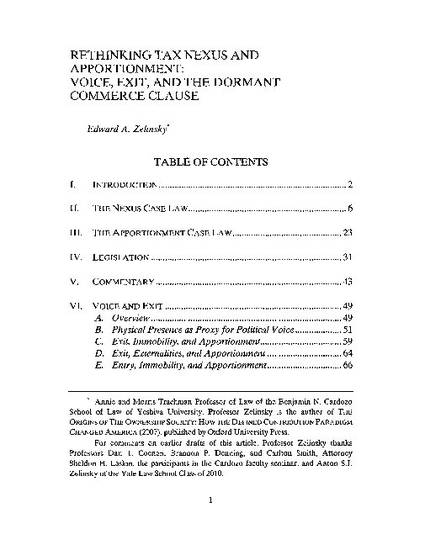
The dormant Commerce Clause concept of tax nexus is best understood as a rough, but serviceable, proxy for the taxpayer's standing in the political process. This perspective leads me to defend Quill Corporation v. North Dakota and the much maligned physical presence test for tax nexus. As a matter of legislative policy, the critics of this test may be correct. However, as a matter of constitutional law, the courts should adhere to an expanded physical presence standard as Congress crafts for the long term broader nexus rules based on economic presence. Taxation is an inherently and irreducibly political matter. An expanded notion of physical presence is a rough, but serviceable, proxy for taxpayers' practical abilities to protect themselves in the political process of the taxing state. A physical presence test for tax nexus thereby protects, albeit imperfectly, against the modern version of taxation without effective representation.
In similar fashion, the dormant Commerce Clause rule of tax apportionment serves four functions. First, apportionment constrains a state from exporting taxes by targeting immobile taxpayers who lack practical exit options to leave the state. Second, apportionment minimizes the out-of-state disruption stemming from taxpayer exit, by ameliorating the mobile taxpayer's need to depart the taxing jurisdiction. Third, the constitutional principle of apportionment, by minimizing interstate actors' state tax burdens, encourages entry by such actors and thus facilitates the interstate mobility of persons and capital. Finally, by curtailing the exit of the most tax-sensitive persons, apportionment bolsters the voices for tax-restraint within the taxing state's political process.
- Commerce,
- Commerce Clause,
- Constitutional Law,
- Jurisdiction,
- Taxation--State and Local,
- Taxation,
- Sales,
Available at: http://works.bepress.com/edward-zelinsky/493/
